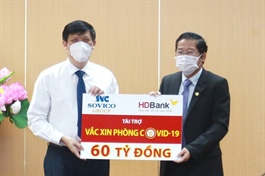Foreign investor participation crucial for operations
Foreign investor participation crucial for operations
The mega-deal between Sumitomo Mitsui Financial Group and FE Credit is expected to rewrite the consumer finance landscape in Vietnam. Masataka “Sam” Yoshida, head of the Cross-border Division of RECOF Corporation and CEO of RECOF Vietnam Co., Ltd., talked with VIR’s Luu Bui about the appetite of Japanese investors for the market.
How would you assess the potential of Vietnam’s consumer finance market and why is the sector attractive to overseas investors?

Masataka “Sam” Yoshida, head of the Cross-border Division of RECOF Corporation and CEO of RECOF Vietnam Co., Ltd
|
Consumer finance in Vietnam has been increasing strongly since around 2013 on the back of rising affluence amid strong economic growth. However, consumer finance remains relatively new to the majority of Vietnamese people, and like many emerging markets, the country presents major growth opportunities for modern consumer finance.
According to publicly released data, consumer loans accounted for 15-20 per cent of all Vietnamese total loans in the last few years, while this rate is more than 35 per cent in neighbouring countries such as Thailand, and between 40-50 per cent in developed countries.
If excluding real estate loans, consumer credit represents approximately 9 per cent of the country’s total loans, far below the 15-35 per cent seen in regional countries such as Malaysia, Indonesia, China, and South Korea. Vietnam has around 97 million inhabitants, 69 per cent of whom are unbanked and 10 per cent are underbanked. Although commercial banks provide various financing solutions, the majority of consumers are still underserved or not served at all. Hence, we believe the market for consumer finance in Vietnam still has significant room to grow.
Given attractive growth prospects, the market share of major players like FE Credit, Home Credit, and HD Saison have been strained due to the fierce competition from younger players such as Shinhan Finance, Lotte Finance, Mirae Asset, Mcredit, and FCCOM. Despite the competition, we notice two major trends among those consumer finance companies that may leave opportunities for any new entrants aiming to penetrate the market.
Firstly, market players are focusing on cross-selling and upselling to existing customers with validated credit history rather than new customers, to mitigate credit risks. Secondly, they likely lack the appropriate lending infrastructure and credit-risk models. As such, we believe the foray into this market should certainly include foreign investor participation for taking advantages of technology-enabled business models and transferring know-how in developing risk and operational processes.
Do you think the SMBC-FE Credit deal is overpriced, and how could this deal impact both sides as well as the market as a whole?
According to FiinGroup research, the price paid by SMFG is almost double the market on price-to-book basis and almost 40 per cent over the average of the market. But on whether the deal has actually been overpriced or not, I would like to refrain from making specific comments.
The main reason for this is that, in such a transaction, the pricing is defined between the concerned parties as a result of lengthy and meaningful negotiations and based on the strategic value of the business specific to the existing and new owners. I have a strong belief that anyone outside the deal is not entitled to refer to it as being overpriced.
Although RECOF could only close one transaction in this sector which was in 2014, we have been involved in a number of potential consumer finance transactions in Vietnam during the last 6-7 years and we are well aware of the value of FE Credit. At least for SMFG, this transaction will help them widen their coverage of the Vietnamese markets by being able to have multiple approaches.
With regard to the know-how in consumer finance businesses that Japanese companies may be able to help with, it is said that the credit assessment and customer scoring system is a focus. However, from the fact that the credit scoring of the Japanese consumer credit companies rely much on the credit information of individuals available in the database of industry-wide institutions in Japan, their expertise may not be readily applicable in a market like Vietnam, where the environment is different.
Debt-collecting businesses are to be banned in Vietnam as part of local government action to protect customers’ rights. However, this is considered a strict approach, with a majority of consumer finance customers underbanked or unbanked. How would this move affect such companies in Vietnam?
We understand banning debt collection services has resulted from the fact that many debt collection agencies for many years have used all possible tactics, whether legal or not, to collect debts. The advantages of using such agencies include fast and high debt recovery ratios.
Putting a stop to the operation of debt collectors obviously poses challenges to lenders or creditors where their collection performance will be affected. Consumer finance companies need to make changes to meet these evolving regulatory requirements. This will be inconvenient, time-consuming, and expensive at first but at the same time creates an opportunity for the consumer finance companies to rethink their collections strategies and operations.
We might also see an increasing trend of selling or trading the debts from those who are not enough strong in debt collection to those who have the time, expertise, and resources required. In fact, debt sales can be an effective tool for certain accounts, especially those with low expected recoveries.
However, it might be better implemented if policies and procedures for debt sales could have clearer guidance from the government.
























